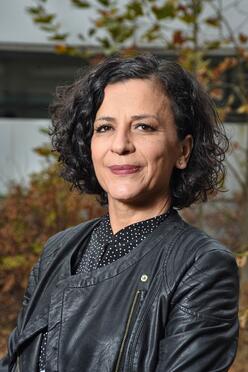
Eleni Papadopoulou is a social worker at AHEPA University Hospital in Thessaloniki, Greece.
Working as a social worker in Greece, every day I meet refugee and migrant women and girls who have come here to find safety. Sadly, when I meet them it is not refuge they have found – but more danger: often at the hands of the people closest to them.
Refugee women and girls are at heightened risk of gender-based violence. Many live in poverty in camps, others are homeless with no shelter, and some have been separated from their family.
In a lot of cases, women who have fled violence will not know where to turn when they face abuse. Hospitals are long distances from camps, refugee women often don’t speak the language and they can have difficulty travelling without an escort.
It is my role to ensure women facing abuse are able to find safety and that they’re linked up to services that can help them, from shelters to mental health programmes.
This can be challenging, I remember a refugee woman who was hospitalised with physical injuries who suddenly asked to leave the hospital without giving reasons. She was frightened and we noticed that when her husband visited her she seemed even more afraid. I went to talk to her and explain her different options. It was a difficult situation as she had children still living in the camp and there was no way of hosting them in the hospital. But eventually, we were able to place the woman and her children in a shelter for survivors, so they could begin to rebuild their lives.
It is crucial that professionals supporting survivors of gender-based violence such as social workers like myself, police officers and health professionals are aware and informed of how to safely locate and help refugee and migrant women.
I recently attended a training session run by the International Rescue Committee that invited social workers, police officers, medical staff and psychologists together to understand how to support refugee and migrant women affected by gender-based violence.
There was a particular focus on how we can all work together. The training highlighted the difficulties we face in reporting incidents between our different front-line services.
This is crucial, as a lack of communication can be detrimental to the wellbeing of the people we help. For example, I learnt that we must keep survivors’ clothes for forensic examination when there is a rape incident. It is the simplest thing – but it could ultimately improve extremely important to catching the perpetrator.
To protect women and girls, we must ensure they are aware of the services that can help them. I would like to see refugee and migrant women being given information when they first reach legal services in Greece, so that they know where they can access help if they need it.
Whether a woman is a refugee or not – the detrimental effects of abuse are the same. Only if we work together can we ensure women remain safe.
Training offered to social workers, police officers and health professionals is funded by ECHO EU Humanitarian Aid.